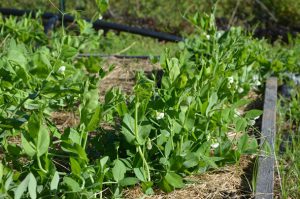
By Les Harrison
Wakulla County Extension Director and
Gohar Umar FAMU Extension Horticulture Specialist
April in Wakulla County is a transitional gardening month. Both spring and winter gardens are being tended, with the winter crops coming to an end soon while the spring crops are developing.
From a weather perspective, the year 2017 has been rough on vegetable gardening. The winter was unusually warm, there have been late cool spells with frost and the rain is either excessive or nonexistent.
Still, the diligent gardeners in the area have been successful with a variety of tasty staples. One of those is English peas. This species has a variety of named cultivars to satisfy almost every taste, and it is relatively simple to grow.
The term “English Pea” is a complete misnomer since the pea arrive relatively late to the British Isles. Once on the British Iles it served as the basis for numerous dishes to feed the gentry and the common people.
Historical records indicate these peas originated in the Mediterranean basin around 6500 years ago. They were likely one of the first cultivated crops at the dawn of farming and agriculture.
As with many early foods, their ease of preservation and portability were important factors for their acceptance and use. As it turned out, they were nutritious too.
Depending on the culture and the pea cultivar, the pea sometimes was consumed with the pod or without. As with the snow peas of today, tender and immature pea pods are certainly tasty and digestible.
Their size and shape are handy, too. No table utensils were necessary, and preparation could be as simple as pulling them out and eating then dry or raw.
The pre-industrial age traveler or soldier at a far flung outpost need only consumer a few handfuls of dried peas to sustain life. Packaging would likely be a small textile or leather pouch with drawstrings if a clay pot was too cumbersome for the situation.
The ease of cultivation was another factor in their widespread popularity. This “cool season” vegetable actually provided some of its own fertilizer so farmers had a head start when planting.
Peas fall in the category of plants called legumes. They naturally have a nitrogen fixing bacteria called Rhizobia which convert this necessary element to a useful form for the plant through its root system.
Other commonly encountered legumes include soybeans, peanuts and clover. Each of these has the ability to utilize the available nitrogen for growth and reproduction.
Peas planted in Wakulla County will easily handle the moderate winter weather typical to the area. The frost which occurred in late March 2017 did not damage the two pea cultivars planted in the UF/IFAS Wakulla County Master Gardener demonstration garden.
Plantings usually occur in autumn or early spring for a harvest in les than 90 days. The two plant beds in the demonstration garden were planted in late February 2017.
Once the summer weather with its high humidity and temperatures set in, the pea plants die. Their remains are still useful though.
If turned into the soil, the stems, leaves and roots will release nitrogen as they degrade. Many gardeners use legumes as to partially meet the nitrogen needs of crops which follow the peas.
With its long history of use, it is still relevant even in 21st century Wakulla County.
To learn more about growing English peas in Wakulla County contact the UF/IFAS Wakulla County Extension Office at 850-926-3931 or https://blogs.ifas.ufl.edu/wakullaco/.
 0
0
